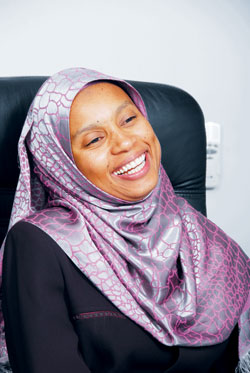Anytime fuel prices go up one woman is always in the spotlight. Sumayya Hassan-Athmani, 37, the Managing Director of National Oil Corporation, has a job which is often like walking a tight rope, writes NJOKI CHEGE
She is the face of the state petroleum marketer and is constantly in the spotlight when fuel prices go up. Sumayya Athmani the managing director of National Oil Corporation of Kenya has managed to put up a brave face despite sharp criticism from the public whenever oil prices rise. New face of Kenya: Sumayya represents the women, youth, Muslims and professionals. [PHOTOS: MAXWEL AGWANDA]

Popular this week